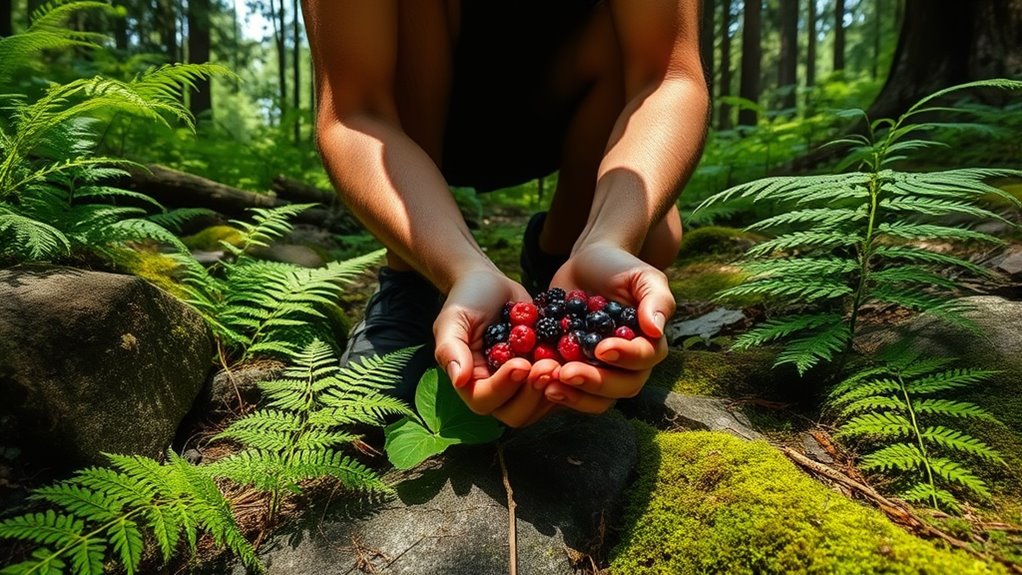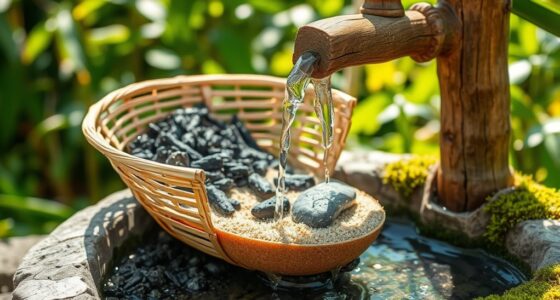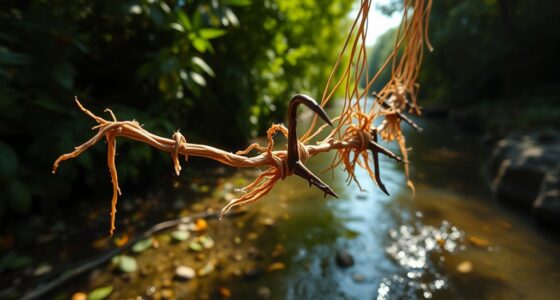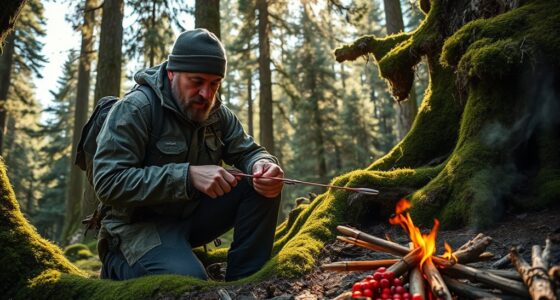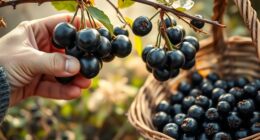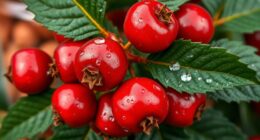Foraging for survival offers mental benefits such as lowering stress, boosting mood, and fostering a connection with nature. As you gather wild foods, you engage your senses, stay active, and practice mindfulness, which reduces anxiety and improves emotional well-being. It also strengthens community bonds and helps preserve cultural traditions. By continuing, you’ll discover more ways these activities support your mental resilience and personal growth in the wilderness.
Key Takeaways
- Foraging enhances mindfulness, reducing stress and improving emotional well-being through sensory engagement with nature.
- It fosters a sense of self-reliance and confidence, strengthening mental resilience in survival situations.
- Engaging with natural environments boosts mood and alleviates anxiety and feelings of isolation.
- Foraging promotes cultural connection and community bonding, supporting social and emotional stability.
- The activity encourages focus and patience, sharpening mental clarity and promoting emotional regulation.
Enhancing Mood and Reducing Stress Through Nature Exposure

Spending time in nature can considerably boost your mood and help reduce stress. When you immerse yourself in green spaces like parks or forests, your feelings of hostility, depression, and anxiety decrease. Even just 10 minutes outdoors can lift your spirits and improve your emotional well-being.
Engaging with natural environments lowers stress hormones and calms your nervous system. Activities such as forest bathing can reduce blood pressure and strengthen your immune system. Being in nature also diminishes feelings of isolation, promoting a sense of calm and relaxation. Incorporating nature exposure into your routine can additionally promote mindfulness and present-moment awareness, further enhancing mental health. Exploring nearby water parks or outdoor recreational spots provides a fun and accessible way to enjoy these benefits. These experiences help you feel happier and more balanced, supporting mental health. Additionally, integrating biodiversity into your routine can enhance your overall mental health benefits. Research shows that green space exposure can have immediate positive effects on mood and reduce fatigue. Overall, spending time in natural settings provides quick, accessible relief from stress and enhances your mood, making it a simple yet powerful way to improve psychological well-being.
Building Community Bonds and Cultural Appreciation
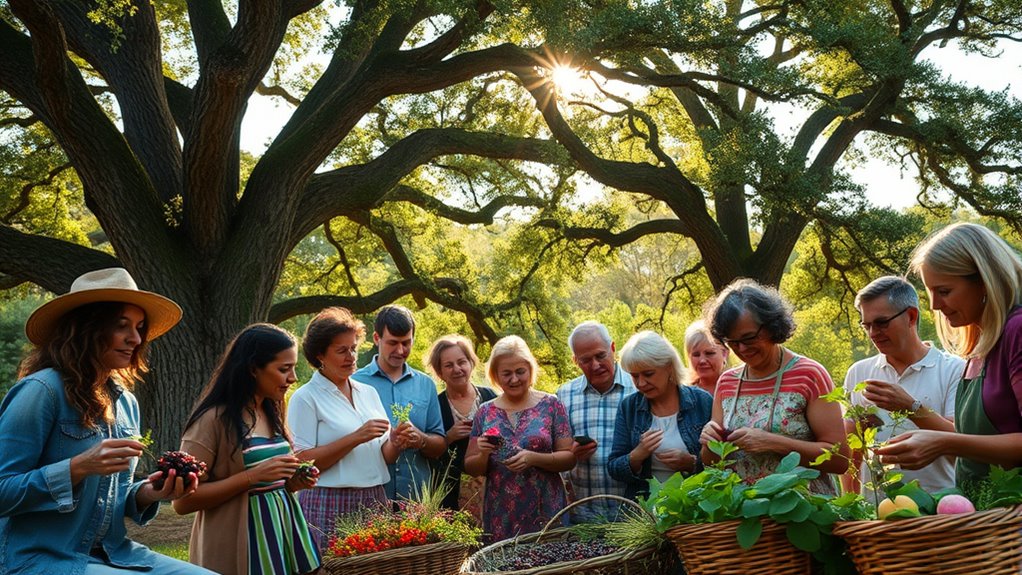
Foraging serves as a powerful tool for building community bonds and fostering cultural appreciation. When you participate in foraging, you help preserve cultural traditions by maintaining ancestral practices and connecting with indigenous communities’ spiritual ties to nature. Sharing knowledge through cultural camps and workshops strengthens intergenerational bonds, passing down stories and skills. These activities encourage collective participation, promoting social cohesion and a sense of belonging. Elders teach younger generations traditional foraging methods, ensuring cultural continuity and respect for elders’ wisdom. Community-led initiatives foster cooperation and shared responsibility for local ecosystems. Additionally, the use of diverse planters can enhance the cultivation of edible plants, further supporting sustainable practices and local food traditions. Incorporating educational outreach can also raise awareness about ecological conservation and sustainable harvesting methods within communities. Promoting toilet maintenance and proper disposal practices during community activities can further support environmental health and sustainable practices. Engaging in tableware best practices during communal meals can also reinforce shared values and traditions, strengthening community identity. Furthermore, understanding the importance of cultural preservation can motivate communities to actively protect their natural and cultural resources for future generations.
Engaging the Senses to Foster Mindfulness and Curiosity
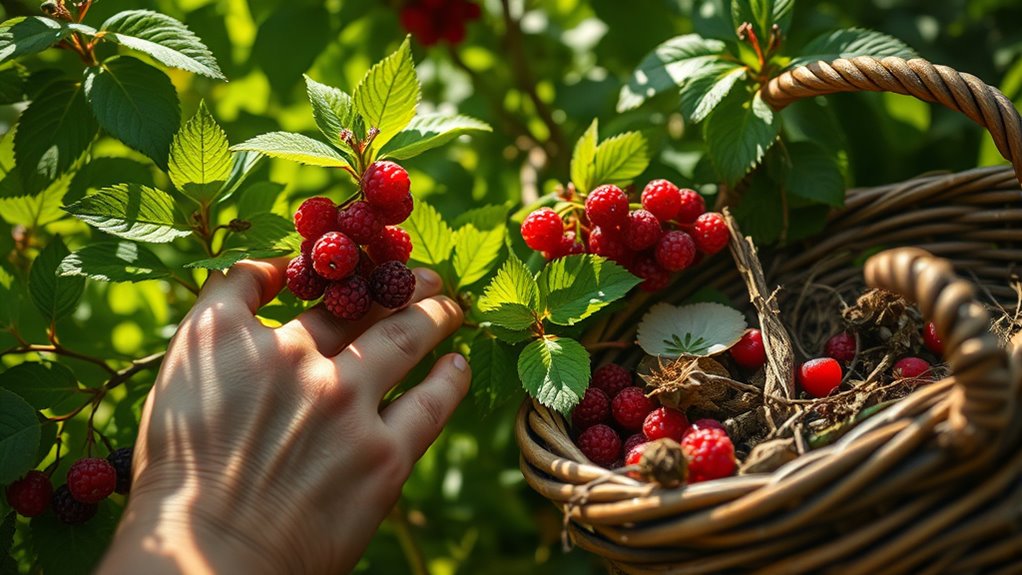
Have you ever noticed how engaging your senses can transform a simple walk in nature into a profound mindfulness practice? When you focus on sight, sound, smell, touch, and taste, you deepen your connection with your surroundings.
Observing colors, shapes, and textures sharpens your visual perception. Listening to birdsong and rustling leaves immerses you in the natural soundscape. Recognizing specific aromas and flavors helps develop your olfactory and gustatory senses. Handling different plants or mushrooms offers tactile stimulation. Incorporating sensory awareness into your routine can significantly enhance your mental clarity and emotional stability.
By integrating these sensory experiences, you foster present-moment awareness, reduce stress, and quiet your mind. This active engagement sparks curiosity, encouraging you to explore, learn, and appreciate the intricate web of nature. Practicing mindfulness through sensory engagement can lead to improved mental health and emotional regulation.
It’s a powerful way to cultivate mindfulness and ignite your natural inquisitiveness.
Promoting Physical Wellbeing and Active Living
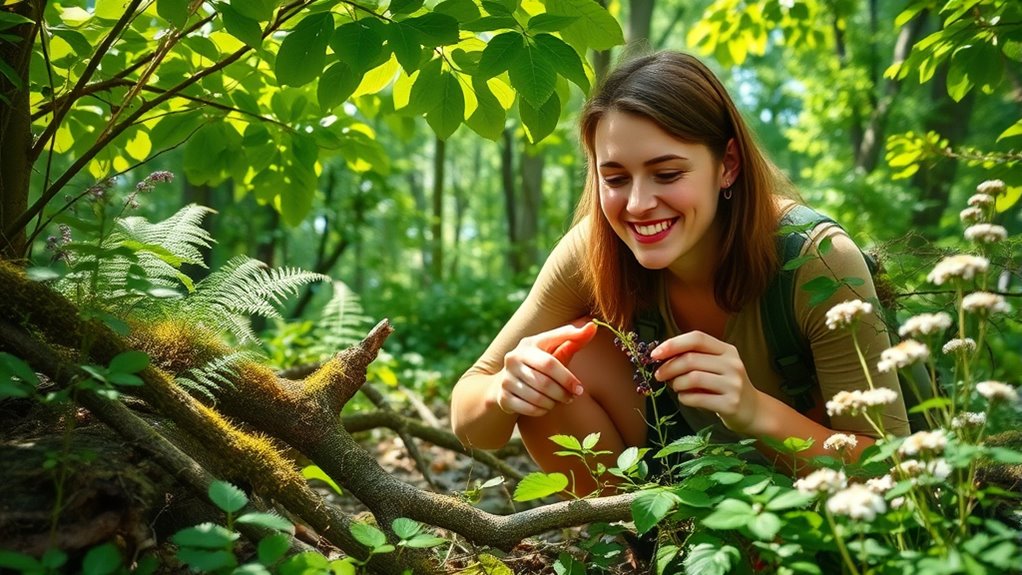
Engaging your senses during outdoor activities naturally encourages more movement and physical activity. When you forage, you walk, search, and haul, which helps maintain a healthy lifestyle. These actions boost your cardiovascular health by increasing your heart rate and blood circulation.
Regular foraging also strengthens muscles and builds endurance, reducing the risk of obesity and related health issues. Wild foods you gather often provide essential nutrients, vitamins, and antioxidants, enhancing your diet with fresh, seasonal produce.
Plus, foraging encourages outdoor exposure, which supports overall physical wellbeing. Sharing this activity with others fosters community bonds and social support, while the physical effort involved promotes confidence and independence.
Combining movement with connection to nature creates a holistic approach to sustaining your health and robustness.
Connecting With Nature for Grounding and Personal Growth
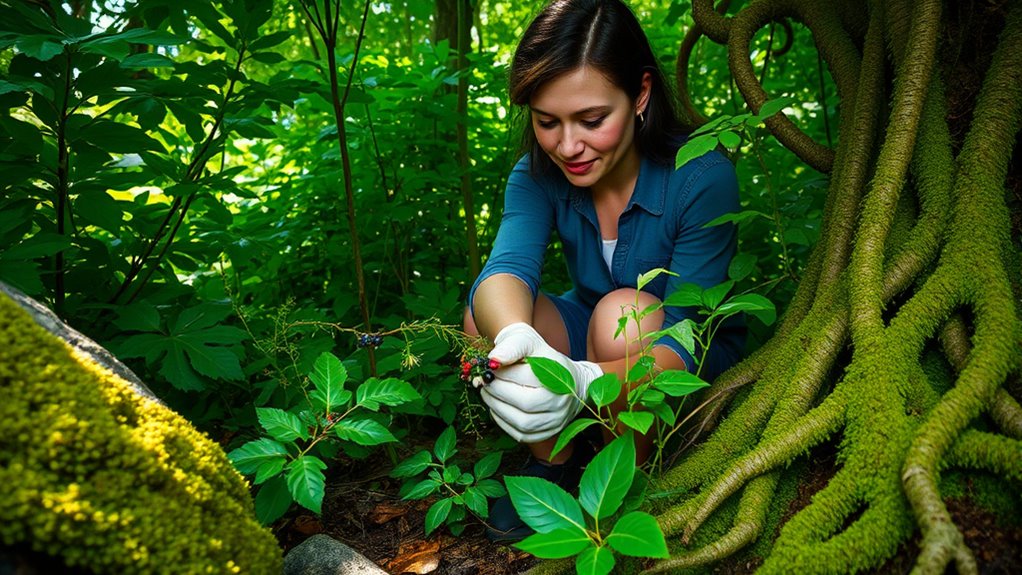
Connecting with nature offers a powerful way to anchor yourself in the present moment and foster personal growth. When you immerse yourself in natural environments, you reduce stress and anxiety while boosting feelings of well-being and satisfaction.
Engaging your senses—touching leaves, listening to birds, or smelling earth—deepens emotional bonds with nature and promotes calmness. Grounding techniques, like forest bathing, enhance mindfulness and help regulate emotions by encouraging focus on the present. Incorporating well-being tips such as these can amplify the positive effects of outdoor activities. Additionally, understanding Best Beaches can inspire more meaningful outdoor experiences that promote mental health.
Spending time outdoors also sharpens concentration and boosts creativity, inspiring purpose and self-awareness. As you develop a stronger connection to nature, you cultivate a sense of responsibility and empathy, which fosters emotional intelligence.
Frequently Asked Questions
How Does Foraging Impact Long-Term Mental Health Resilience?
You might wonder how foraging impacts your long-term mental health resilience. When you engage regularly, you build a deeper connection with nature, which boosts emotional resilience and reduces stress.
It also sharpens your decision-making and problem-solving skills, supporting cognitive health. Over time, foraging helps prevent depression and anxiety, promoting emotional stability and well-being.
Can Foraging Help Reduce Symptoms of Depression and Anxiety?
Your question about reducing depression and anxiety symptoms through foraging is essential. You might find that engaging with nature is like hitting the mental reset button, calming racing thoughts and lifting your mood.
Foraging stimulates your senses, promotes mindfulness, and provides a sense of accomplishment. These activities help you stay present, reduce stress, and foster emotional balance, making it an effective, natural way to ease symptoms and improve overall mental well-being.
What Are the Psychological Effects of Learning Traditional Foraging Skills?
When you learn traditional foraging skills, you boost your confidence and sense of self-sufficiency, which helps improve your mental health.
You engage with nature, reducing stress and anxiety, while practicing mindfulness enhances your focus and cognitive flexibility.
The process of mastering these skills offers a sense of accomplishment and purpose, fostering emotional resilience.
Plus, sharing this knowledge with others strengthens social bonds, making you feel more connected and supported.
How Does Foraging Influence Emotional Regulation and Coping Strategies?
Think of foraging as your emotional compass, guiding you through life’s storms. When you engage with nature’s bounty, you actively connect, which calms your mind and sharpens your focus.
It helps you manage stress by releasing feel-good endorphins and boosts resilience through problem-solving and goal-setting. As you adapt to changing conditions, you build coping skills, transforming challenges into opportunities for growth and emotional balance.
Are There Cognitive Benefits Associated With Mastering Foraging Techniques?
Mastering foraging techniques offers you significant cognitive benefits. As you learn and refine skills, your spatial memory improves, helping you remember food sources and navigate environments better.
You become more adaptable, developing problem-solving skills to handle changing conditions. This process also enhances cognitive flexibility, allowing you to switch strategies efficiently.
Conclusion
By foraging, you not only nourish your body but also boost your mental well-being. Imagine Sarah, who started foraging to survive and found herself feeling calmer and more connected to nature. As you explore wild foods, you’ll build community bonds, reduce stress, and enjoy physical activity—all while fostering curiosity and mindfulness. So, step outside, embrace the journey, and discover how foraging can transform your mind and spirit in unexpected ways.

